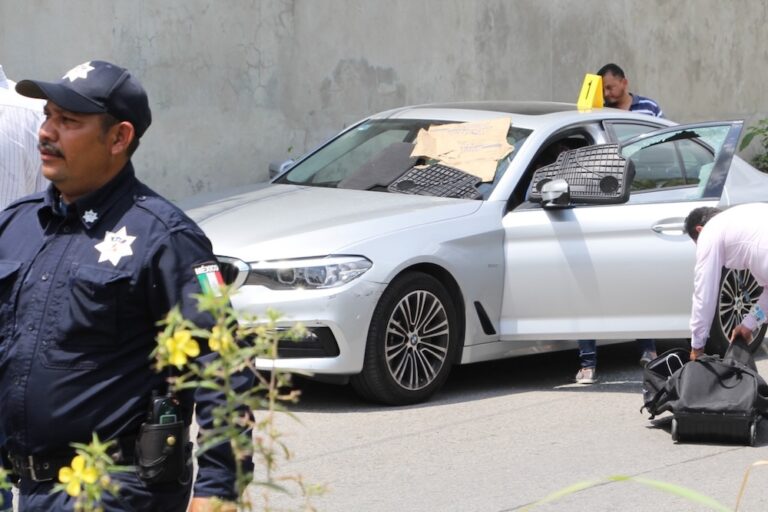(IAPA/IFEX) – The following is an abridged version of a 31 August 2005 IAPA press release: IAPA: Publishers from northern Mexico unite to combat violence against journalists They sign the Declaration of Hermosillo MEXICO CITY, Mexico (August 31, 2005) – Under the sponsorship of the Inter American Press Association (IAPA) 40 newspaper executives from the […]
(IAPA/IFEX) – The following is an abridged version of a 31 August 2005 IAPA press release:
IAPA: Publishers from northern Mexico unite to combat violence against journalists
They sign the Declaration of Hermosillo
MEXICO CITY, Mexico (August 31, 2005) – Under the sponsorship of the Inter American Press Association (IAPA) 40 newspaper executives from the northern border region of Mexico called on federal and state officials in their country to solve crimes against journalists and urged that such offenses be dealt with under federal jurisdiction and exempt from statutes of limitation.
At the Meeting of Publishers of the Northern Border Region, held yesterday in Hermosillo, Sonora state, they drafted and signed the “Declaration of Hermosillo,” a document in which they agreed to band together to fight violence against journalists. The Declaration sets forth a series of actions to be taken, including nomination of a special team of investigative reporters to continue the work of murdered colleagues, publication of public awareness campaigns and training of journalists.
Following a welcome by Juan Fernando Healy, editor of the host newspaper El Imparcial, IAPA President Alejandro Miró Quesada told the meeting that “it is auspicious that executives of 40 media outlets have gathered to coordinate strategies and together confront the organized crime that is afflicting the region.” He added that the media should be “the first to act in the face of this serious problem and that is what you are doing today.”
Miró Quesada, editor of the Peruvian newspaper El Comercio, said that beyond what the media is doing, Mexican authorities must not shirk their duty to guarantee the free flow of information.
Among those attending the meeting from states on the Mexico-United States border – Baja California, Sonora, Chihuahua, Coahuila, Nuevo León and Sinaloa – was Jesus Blancornelas, editor of the Tijuana weekly paper Zeta, who has been the victim of several attempts on his life by drug traffickers. Blancornelas urged his colleagues “to put the logos of our companies to one side and fight together in common cause against violence and impunity.”
Juan Francisco Ealy Ortiz, vice chairman for Mexico of the IAPA’s Committee on Freedom of the Press and Information, declared, “This is a first step to bringing the Mexican newspapers together with common purpose . . . We wish to send the message that we will be working together against organized crime.”
Throughout the meeting presentations included references to Alfredo Jiménez Mota, a reporter with the host newspaper who was kidnapped on April 2 this year and whose whereabouts remain unknown. Those present also mentioned journalists Dolores Guadalupe García Escamilla, Raúl Gibb Guerrero, Gregorio Rodríguez Hernández, Francisco Arratia Saldierna and Francisco Ortiz Franco – all murdered since mid-2004.
Enrique Santos Calderón, chairman of the IAPA’s Impunity Committee and editor of the Bogotá, Colombia, newspaper El Tiempo, spoke of experiences of the press in Colombia throughout its battle against drug trafficking, and stressed the need to raise quality standards of reporting.
Gonzalo Marroquín, chairman of the IAPA’s Committee on Freedom of the Press and Information and editor of the Guatemala City, Guatemala, newspaper Prensa Libre, reported on meetings the IAPA delegation had held the previous day with Mexico’s President Vicente Fox and representatives of the judiciary and legislature. He said that the IAPA had called for steps to be taken to combat violence and impunity, among them the federalization of crimes against journalists, that these crimes not be subject to any statutes of limitation, and that stiffer punishment of the guilty be imposed.
IAPA Press Freedom Director Ricardo Trotti mentioned the immediate support his organization would be able to provide the Mexican newspaper publishers and editors, beginning with the plan for a public awareness campaign and the training of journalists.
The delegation presented an excerpt of the IAPA’s “risks map”, depicting Mexico and drawn up by Idalia Gómez of the Association’s Rapid Response Unit. The map, based on the reported incidents of violence in Mexico, Colombia and Brazil, seeks to help reporters lessen personal risk as they cover the news.
For full text of the Declaration of Hermosillo, visit: http://www.sipiapa.com/pressreleases/chronologicaldetail.cfm?PressReleaseID=1464


